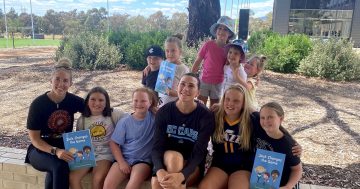
You may be tempted to post that first day at school photo right away, but take a few seconds to make sure it’s safe. Photo: Supplied.
With kids finally back in the classroom, most people’s social media feeds have been clogged this week with happy snaps of children heading off to school.
It’s almost a rite of passage for many kids – parents and loved ones eagerly buzzing around, camera in hand, to capture the moment before their first day at school.
This time of year, social media feeds are flooded with images of children with fresh uniforms, backpacks and hats.
For most of us, it’s a chance to share an important moment with family and friends, but it can have a darker side.
The Australian Federal Police (AFP) is urging parents to be careful about the information they share about their children online.
AFP Commander Hilda Sirec heads the Australian Centre to Counter Child Exploitation (ACCCE) and she says back-to-school week is a good time to highlight the need for cyber-safety.
“The first day of school is a treasured milestone for parents and carers and a happy memory for many families,” Commander Sirec said.
“However, we do urge people who are sharing those images to make sure they’re using secure privacy settings on social media and only sharing them with people they know and trust.”
READ ALSO: School RAT rollout challenging for some parents; will be re-assessed before round two
She says parents and carers can continue to post their snaps online, but should take steps to ensure they’re doing it safely.
These include limiting identifying details such as name or address, checking privacy settings and avoiding posting pictures of students in their school uniforms.
“We have seen some offenders go to great lengths to gain access to children and, in some instances, online grooming has started with information that parents and carers have shared online,” Commander Sirec said.
“The more information available about a child online, the easier it can be for offenders to build a profile to groom them, or even to groom parents in a bid to access information about their children.”
The AFP says investigators regularly seize images of children in the collections of online child sex offenders.
“You wouldn’t walk up to a stranger and give them a photo album of your children and tell them their names or location,” Commander Sirec says.
“We all need to remember that in the digital age, that is the equivalent of posting information and images of children online without the appropriate safeguards.”

Police have identified 800,000 accounts sharing child abuse material. Photo: PeopleImages.
The warnings are part of an AFP safety campaign that aims to make parents aware of the dangers of online predators.
The AFP says since the beginning of the COVID-19 pandemic, the ACCCE has identified 800,000 accounts using the internet to share child abuse material.
The accounts use encrypted apps and the dark web to stay anonymous.
Commander Sirec is urging parents and carers to teach their children about the dangers of sharing personal details and private photos online.
“It’s perfectly natural for kids and young teens to wish to interact with people their own age online,” Commander Sirec says, “but predators prey upon this to gain access to children, and can pose as children themselves.”
She says, as school starts again, many students may be using tablets and mobile phones to connect with each other on social media for the first time. That means it’s a good time to remind them to make sure they know who they’re talking to online and to teach them to be safe.
Commander Sirec said the AFP recommends all parents and carers have the following conversations with their children when they are old enough to sign up for social media:
- Discuss their online activities, including how they intend to use an app and who they will be interacting with;
- Talk about appropriate privacy settings. The AFP recommends strong privacy settings and regularly checking that they are still in place as they can be changed at any time;
- Talk about how to recognise a suspicious friend or follower request and what to do about it (block, and if, necessary, report);
- Discuss their options if someone online was asking personal questions or even asking for sexualised images;
- Make sure your child has a support network of trusted people they can talk to if something goes wrong.
“We know parents and carers are doing a great job raising their kids,” Commander Sirec says, “that is why we are encouraging them to have important safety conversations with children before they sign up to social media services to prevent the risk of online child sexual exploitation.
“These conversations are vital to helping protect children online but also for creating an open and non-judgemental channel of communication throughout their teenage years.”
If you believe your child is experiencing issues online, it’s important to collect evidence. It’s recommended you take screenshots or photos of the content, then block and report the app, site or platform.
Online child sexual exploitation can be reported to the ACCCE or call Crime stoppers on 1800 333 000.
If you believe a child is in imminent danger, call police Triple Zero (000) or visit your local police station.















